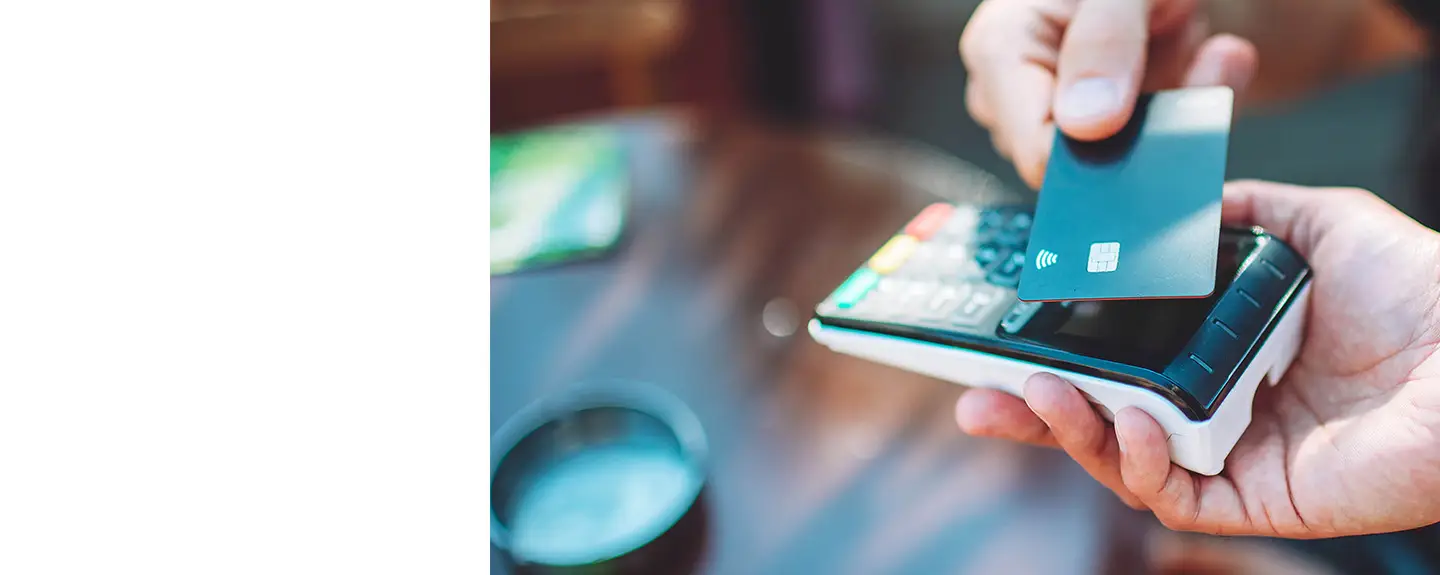Key takeaways:
- Both credit and debit cards have pros and cons; it’s important to know which card to use when.
- Credit cards allow you to build credit and earn rewards, but that can come at a cost.
- Debit cards help you manage your money and avoid fees, but you leave behind some valuable advantages, such as building credit.
Next time you’re asked, “debit or credit?” think twice.
Both credit and debit cards make it easy to pay for things online and in person. But convenience comes with a choice. Which card should you use?
How you pay matters, and here’s why…
Debit card vs. credit card: what’s the difference?
If you set your debit and credit cards side by side, they may look a lot alike. But they are quite different in how they work.
When you use your debit card, money is immediately withdrawn from your checking account to cover the transaction. Even if the card has a Visa or MasterCard logo, it still functions as a debit card. You can use a debit card for almost all the same things you can buy using a credit card.
When you use a credit card, you are borrowing money against a pre-approved line of credit, up to a set limit. You have a certain amount of time, called a grace period, in which to pay that money back. If you don’t pay off the balance each month, you pay interest, and your debt builds up.
While it may be tempting to just use whatever card is handy, here’s what to consider when choosing whether to use a credit or debit card the next time you tap or swipe.
Credit card pros and cons
Credit cards come with both advantages and drawbacks. You can maximize the advantages by choosing the best credit card for you in terms of rates, fees, rewards, and more.
Pro: easier to dispute purchases
If something you purchased was defective, damaged during shipment, or it failed to arrive altogether, you can dispute the charge. This is particularly valuable when shopping online. Once you register the dispute, you are not responsible for paying the amount owed until you settle the issue with the financial institution that issued the card.
Pro: allows you to build credit
Responsible use of a credit card is a great way to build credit because your usage (how much you charge, how much of your bill you pay each month and whether it’s paid on time) is reported to the credit bureaus. Even when you make small purchases, you can improve your credit score by promptly paying off your credit card balance each month. You can also use a secured credit card to build credit from scratch. It works like a regular credit card, but it's backed by funds on deposit in your savings account.
Pro: rack up rewards
Many credit cards allow you to earn points when you spend money; you can use the points for travel and other items. For example, when you shop with a Global Visa® Credit Card, you can earn and redeem reward points for travel expenses, online shopping, merchandise, and more. Benefits also include rental car insurance that backs up your own personal auto policy, extended product warranties, and more.
Pro: fraud protection
If your credit card is stolen or hacked and then used online, your liability for these fraudulent charges (i.e., the amount you are responsible to pay) is limited if you report the loss.
Pro/Con: you can spend up to the limit
Having access to money you don’t have can be a benefit and a risk. You can use a credit card to pay for emergencies—if your car breaks down or if you must travel to attend a funeral, for example. But a credit card also makes it tempting for you to make impulse purchases that you wouldn’t ordinarily make.
Con: risk of going into debt
Paying with a credit card is easy—sometimes too easy. Which means you risk building up debt that is difficult to pay off, hurting your credit, and being charged interest. Your goal should be to pay off your credit card balance in full each month. If you can’t do this, you may want to consider limiting your spending by using a debit card instead.
Con: credit card fees
Credit card fees come in many forms, and those fees can add up if you’re not careful. You’ll pay interest if you don’t pay off your balance each month. Some credit cards also charge annual fees, although the Global Visa® Credit Card has no annual fee for Global checking account holders. You may face other charges, including a balance transfer fee, fee for cash advances, or late payment and returned payment fees.
Con: limited access to physical cash
While you can use a credit card to get cash, the transaction typically comes with a cash advance fee. If you need physical cash, it’s usually less expensive to visit an ATM and withdraw using your debit card.
Debit card pros and cons
Debit cards offer many advantages over a credit card, but they have some drawbacks as well.
Pro: keep your spending in check
Because a purchase made using a debit card uses money withdrawn directly from your bank account, you are limited to spending only the amount of money you have, which helps you stick with a budget. For example, you could have your debit card tied to a specific account set up just for non-essential things, like dining out. This would limit your purchases and help keep you on track.
Pro: avoid going into debt
The money you spend when you use a debit card is your own money; you don’t need to pay it back. This means you can only spend what’s available in your account, which keeps you from going into debt.
Pro: avoid credit card fees
There are often fewer fees associated with a debit card when you use it to make purchases. As mentioned previously, some credit cards charge annual fees, balance transfer fees, fees for cash advances, late payment fees, and/or returned payment fees.
Pro: access to physical cash
When you use your debit card to get cash at an in-network ATM, there will be no additional cost. For example, you can use your Global Visa® Debit Card at more than 55,000 surcharge-free ATMs worldwide. Your Global Visa® Debit Card is linked to your Global checking account, but you can also access your Savings, Money Market, consumer loan, or credit line with the same card at an ATM. You may even be able to use your debit card to get cash back with your next purchase if you don’t have time to stop at an ATM.
Pro/Con: fraud protection
While credit unions and banks provide fraud protection if your debit card is lost, stolen, or hacked, it can be a bit different from if you’d used a credit card. Replacement funds can be held up or denied if you delay reporting fraud or for other reasons, putting you in a tight spot for cash.
Con: you can’t build credit
Using a debit card does not help you build credit. Since you’re technically using your own money, there is no credit transaction and no impact on your credit score. That said, using your debit card can help you manage your debt. If you have a high balance on your credit card and just use your debit card while you pay down your credit card balance, this will help your credit score recover.
Con: you won’t earn rewards
While there are a few exceptions, a debit card is usually not tied to any reward program, which means you could leave valuable perks behind. However, keep in mind that those reward programs typically come with a cost; you must decide whether they’re worthwhile.
Con: checking account fees
Because your debit card is tied to your checking account, you could incur fees if you overdraw the account, just as you would if you bounced a check. And if you use your debit card to get cash from an out-of-network ATM, you are often charged a fee.
Final thoughts
Both credit and debit cards come with their own pros and cons. But whichever you use, take steps to protect yourself. Always check your statements and report errors immediately. If you’re not confident about a transaction (i.e., you’re travelling overseas, shopping online, or purchasing gas at a sketchy-looking station), protect yourself by using a credit card. If you’re working hard to manage your debt, help yourself stick to a budget by using your debit card.
It's easy to pay with plastic; just make sure you’re using the right card for the situation.







